
Our study about the adaptation of tropical rainbowfish is the cover and editor’s choice for this month’s issue of Heredity!
Great photo by Keith Martin ![]()
![]()
![]()
![]()
![]()
Click here for open access PDF of the paper.
Reference:
Gates K, Sandoval-Castillo J, Brauer C, Unmack P, Laporte M, Bernatchez L, Beheregaray LB (2023). Environmental selection, rather than neutral processes, best explain regional patterns of diversity in a tropical rainforest fish. Heredity doi: 10.1038/s41437-023-00612-x
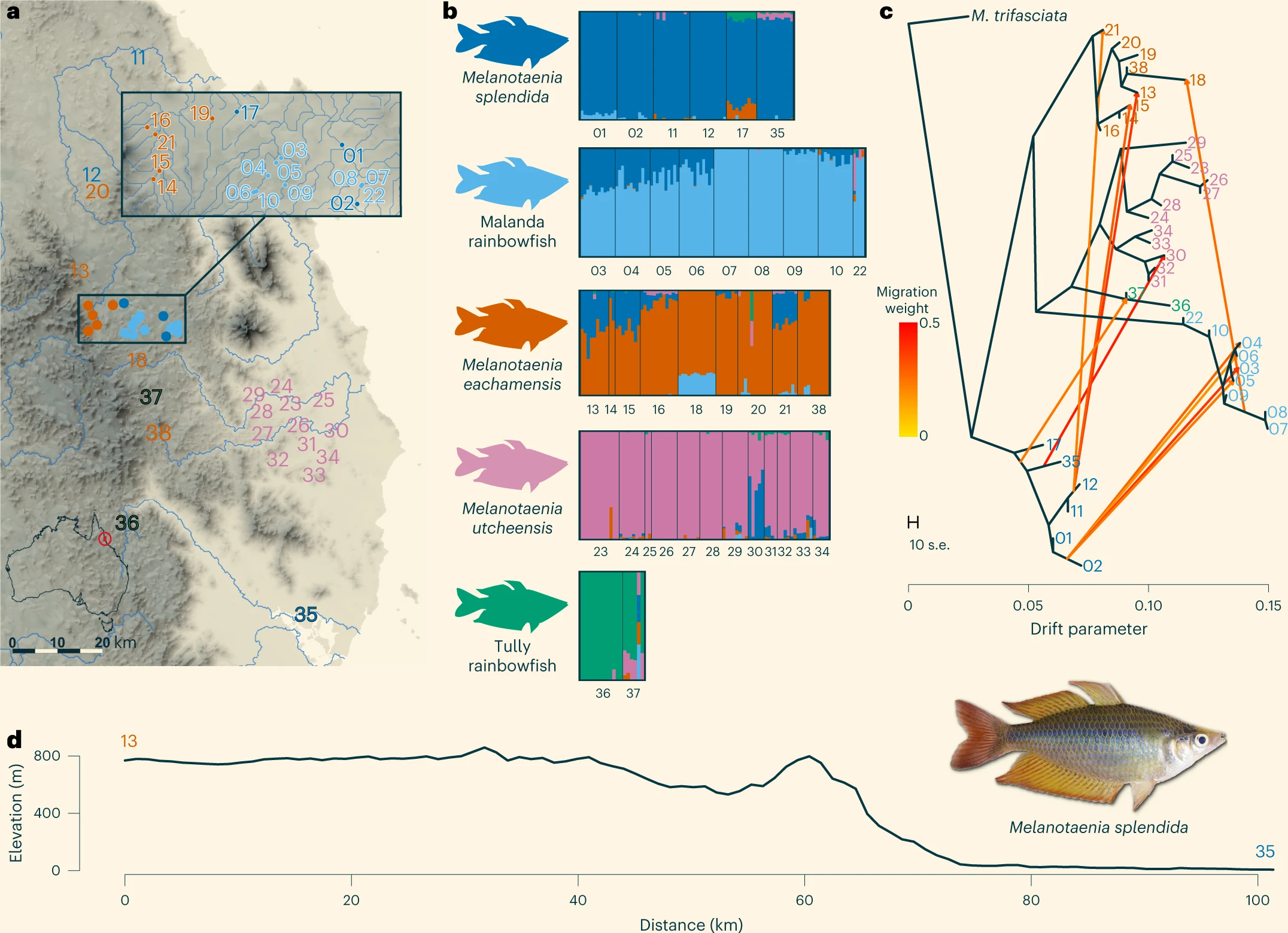
Mixing between species can enhance resilience to climate change!
MELFU’s new study published in Nature Climate Change offers hope for the biodiversity threatened by climate warming. These findings build on over a decade of work by the lab in collaboration with fish gurus Michael Hammer, Peter Unmack, and Louis Bernatchez.
Click here for open access PDF of the paper.
Our paper has also been featured in the “News and Views” section.
Reference:
Brauer CJ, Sandoval-Castillo J, Gates K, Hammer M, Unmack P, Bernatchez L, Beheregaray LB (2023). Natural hybridization reduces vulnerability to climate change. Nature Climate Change. https://doi.org/10.1038/s41558-022-01585-1
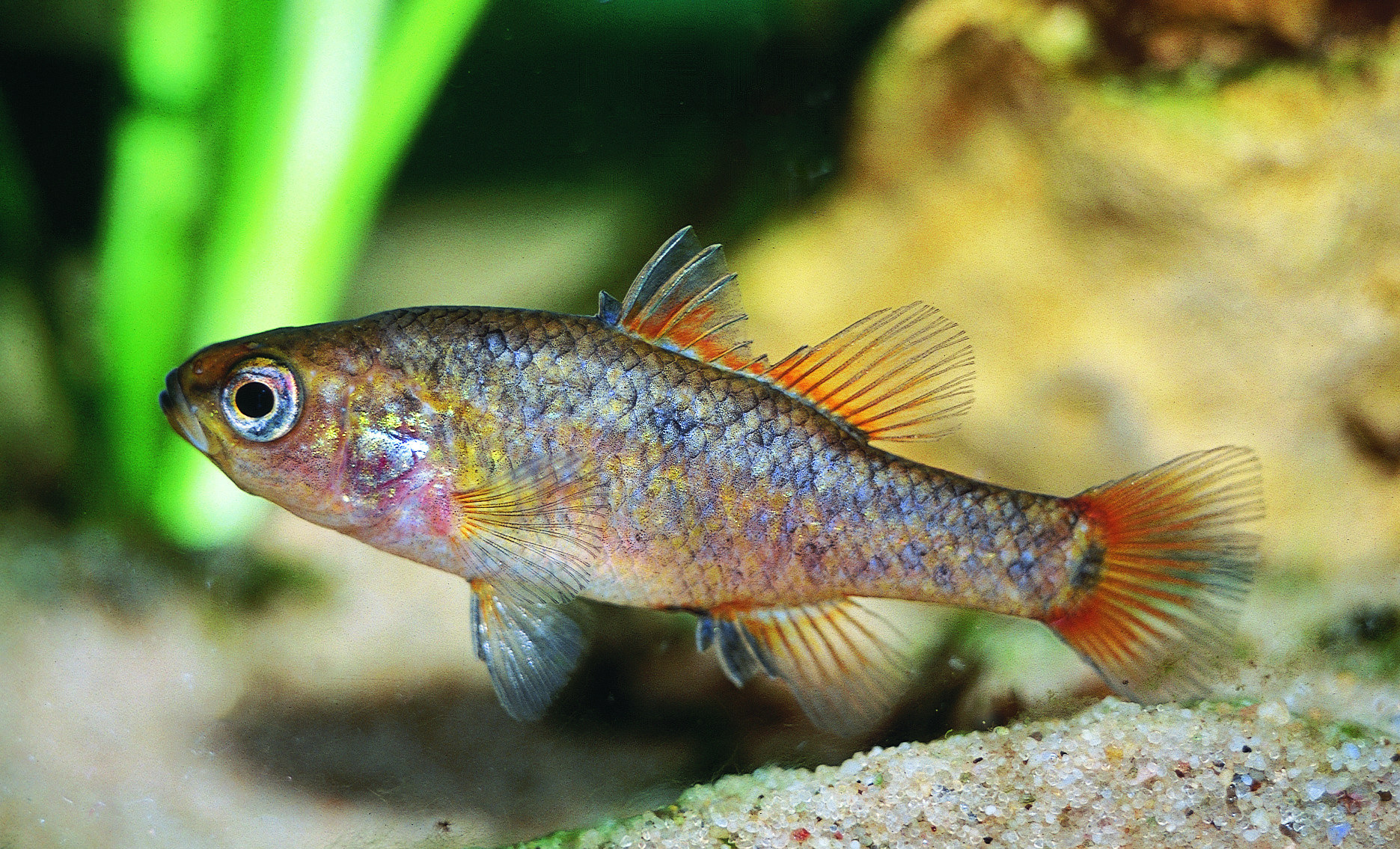
Our 11 year genomic monitoring shows that the reintroduction of the locally extinct southern pygmy perch into Australia’s Lower Lakes is working. The reintroduced population maintained its genetic diversity, fitness, and adaptive potential after 8 generations in the wild!
Study published in the prestigious Conservation Biology journal, link here.
For a popular version of the study, see article in Current Conservation here.

Our lab’s work published in PNAS found that the potential of species to adapt to climate change depends on where they evolved.
We looked at the capacity of life to respond to future climates in three different regions: temperate and subtropical regions, and in deserts. We did this by studying rainbowfishes from Australia.
Click here for open access PDF of the paper.
Also see our popular article about this work on The Conversation.
Reference:
Sandoval-Castillo J, Gates K, Brauer CJ, Smith S, Bernatchez L, Beheregaray LB (2020) Adaptation of plasticity to projected maximum temperatures and across climatically defined bioregions. Proceedings of the National Academy of Sciences 117, 17112-17121.
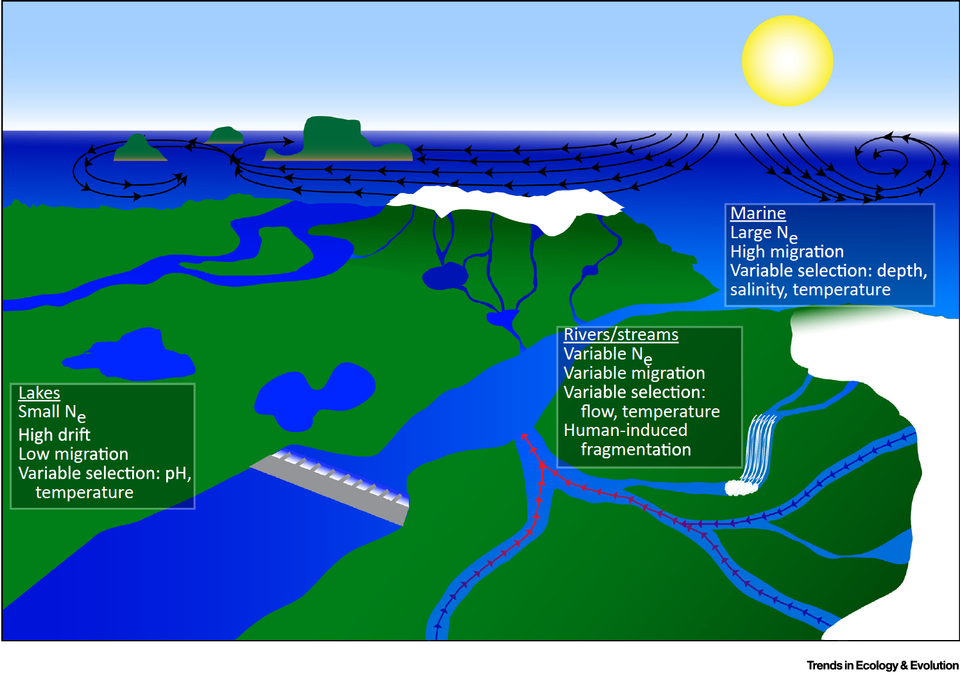
Our TREE review paper on aquatic landscape genomics is now published!
In this collaborative work with US and Canadian scientists we provide researchers with a roadmap to plan aquatic landscape genomics projects by aggregating spatial and software resources and offering recommendations from sampling to data production and analyses, while cautioning against analytical pitfalls.
Grummer JA, Beheregaray LB, Bernatchez L, Hand B, Luikart G, Narum SR, Taylor EB (2019) Aquatic landscape genomics and environmental effects on genetic variation. Trends in Ecology and Evolution DOI:https://doi.org/10.1016/j.tree.2019.02.013
The paper can be accessed here.
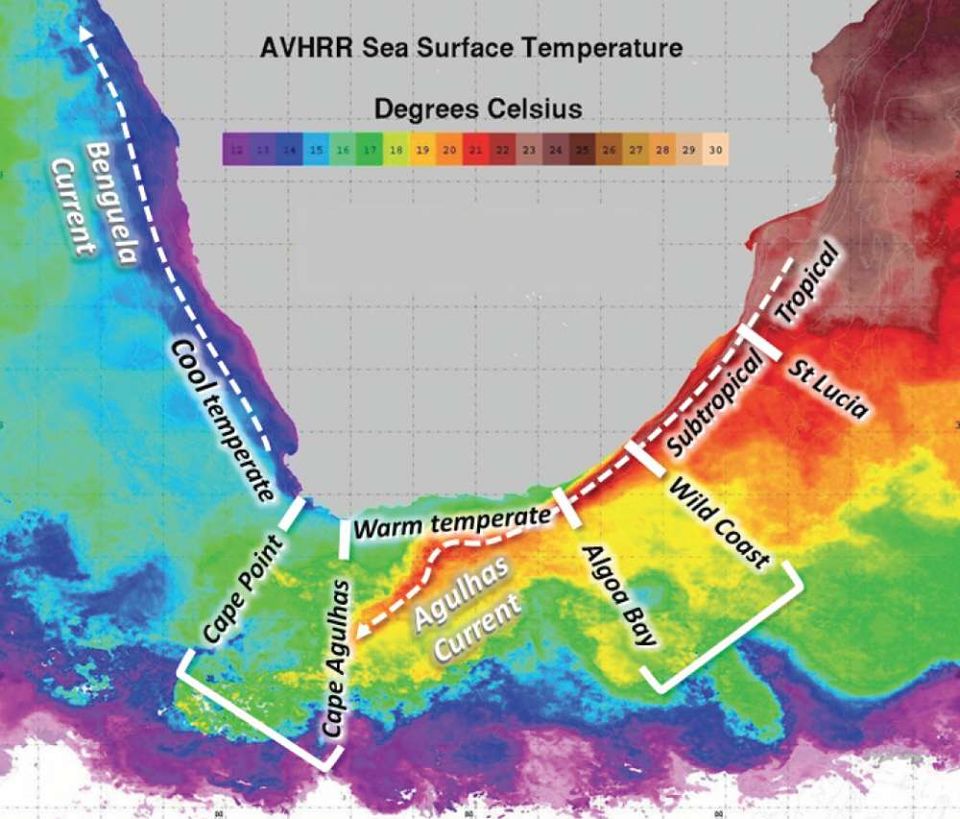
Our latest seascape genomics study published in Proceedings B helps explaining why the oceans have an amazing diversity of life.
Work done along the South African coast in collaboration with Peter Teske’s team at University of Johannesburg. It is generating a lot of media attention, such as this nice article in IFLS.
– Teske, PR, Sandoval-Castillo J, Golla TR, Emami-Khoyi A, Tine M, von der Heyden S, Beheregaray LB (2019) Thermal selection as a driver of marine ecological speciation. Proceedings of the Royal Society of London B 286: 20182023.
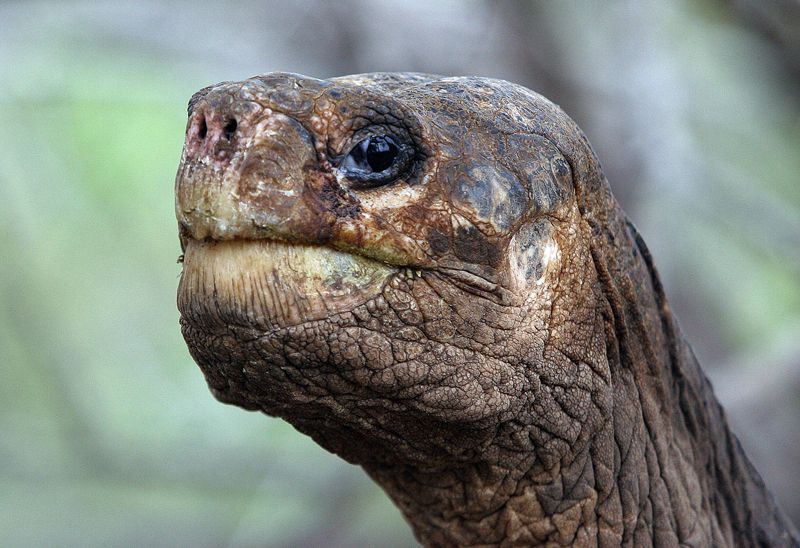
Our comparative genomics study informs about evolutionary mechanisms linked to cancer resistance and longevity in giant tortoises. A fascinating study led by colleagues at Yale University and Universidad de Oviedo that has generated huge media attention worldwide, including an editorial in Nature and an article in the New York Times.
The paper is open access.
Quesada V, Freitas-Rodríguez S, Miller J, Pérez-Silva J, Jiang Z, Tapia W, Santiago-Fernández O, Campos-Iglesias D, Kuderna L, Quinzin M, Álvarez M, Carrero D, Beheregaray LB, Gibbs J, Chiari Y, Glaberman S, Ciofi C, Araujo-Voces M, Mayoral P, Arango J, Tamargo-Gómez I, Roiz-Valle D, Pascual-Torner M, Evans B, Edwards D, Garrick R, Russello M, Poulakakis N, Gaughran S, Rueda D, Bretones G, Marques-Bonet T, White K, Caccone A, Lopez-Otin C
(2018) Giant tortoise genomes provide insights into longevity and age-related disease.
Nature Ecology & Evolution doi.org/10.1038/s41559-018-0733-x
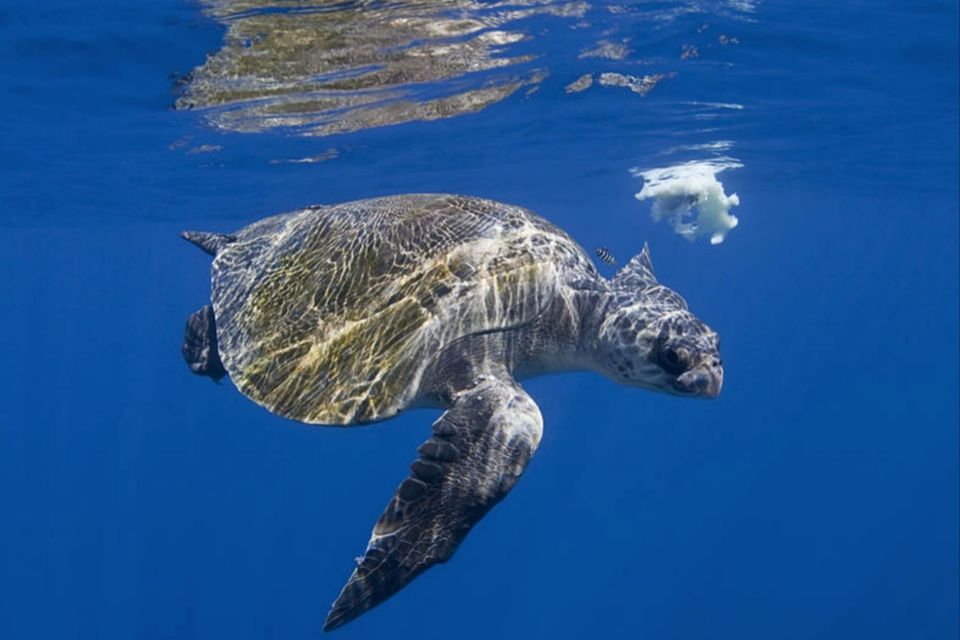
Our recent paper in Proceedings B shows how seasonal ocean currents can influence the mating and connectivity in sea turtles. This extensive seascape genetics work (i.e. based on >600 turtles collected at 27 nesting beaches in five countries, from Mexico to Panama) has important implications for the conservation management of endangered Olive Ridley turtles in the eastern tropical Pacific (the main area of reproduction of the species in the world).
Media release: https://news.flinders.edu.au/blog/2018/05/08/sea-turtles-like-it-local/
Publication: http://rspb.royalsocietypublishing.org/content/285/1878/20180264
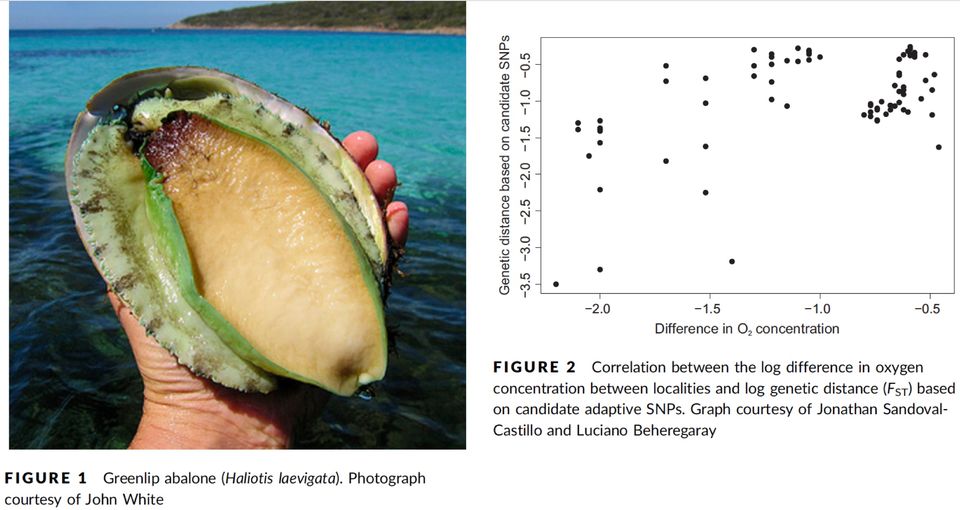
Our recent paper on genomics of adaptation in abalones is featuring in this month’s ‘News and Views’ of Molecular Ecology! A nice article by University of Cologne’s Kathryn Lampert, entitled “Oxygen concentration drives local adaptation in the greenlip abalone (Haliotis laevigata).”
The PDF is free access at https://onlinelibrary.wiley.com/doi/epdf/10.1111/mec.14563
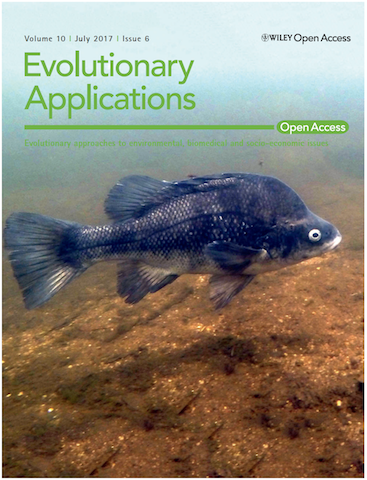
Our latest paper on genetic rescue is cover of Evolutionary Applications! This major and timely study of Macquarie perch is a collaboration with Paul Sunnuck’s Lab at Monash University and with several government fisheries agencies.
Title: “Severe consequences of habitat fragmentation on genetic diversity of an endangered Australian freshwater fish: A call for assisted gene flow”
This paper is Open Access, access it here
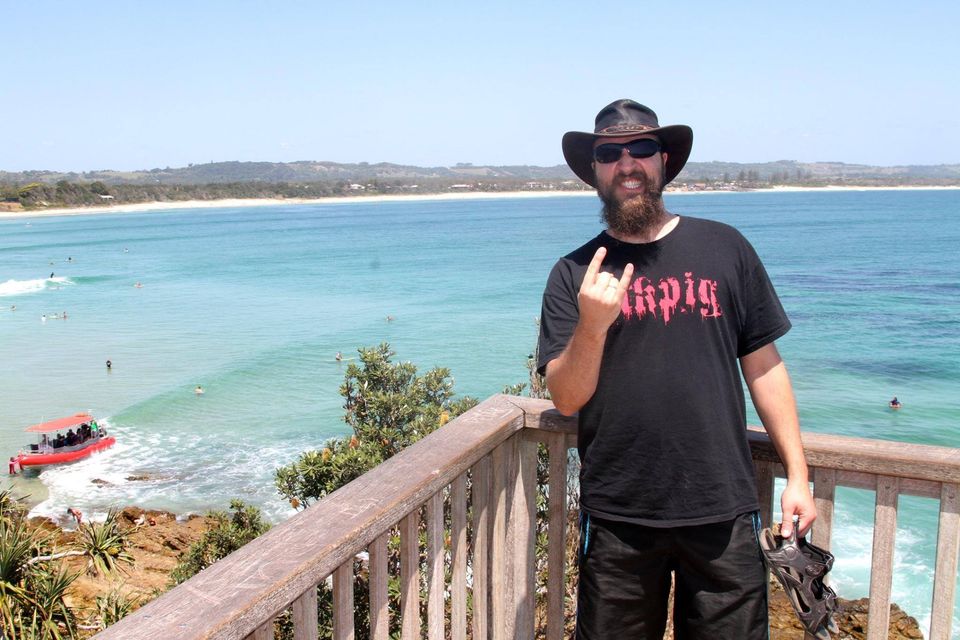
Congratulations to MELFU’s Fabricius Domingos for being awarded the Vice-Chancellor’s Prize for Doctoral Thesis Excellence. This award recognises his outstanding academic performance in the course leading to the Doctor of Philosophy (PhD). Put it in another way, this is a badass PhD thesis about the evolution of lizards from Brazil’s Cerrado.
PARABÉNS FABRICIUS!!

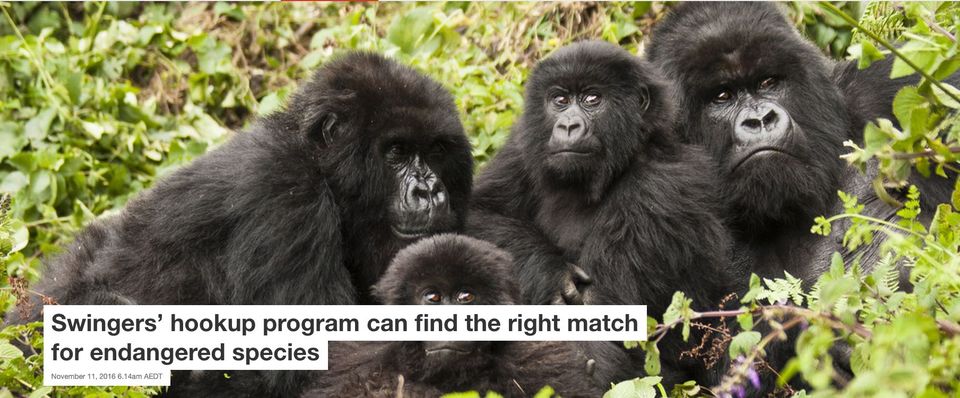
We have created SWINGER, the first computer software with an algorithm that uses information from DNA to match-make endangered animals for captive breeding.
A quick look at the popularity of online dating services shows us that people are pretty comfortable with letting an algorithm choose them a mate. Now we want to do a similar thing for other animals. With human-driven extinctions on the rise, many species are likely to be left relying on captive breeding for their survival. We hope that our algorithm will help ensure these breeding programs are successful, by pairing up matches who will have healthy, thriving offspring. Our program was recently published in Molecular Ecology Resources.
See our cool article about SWINGER at The Conversation
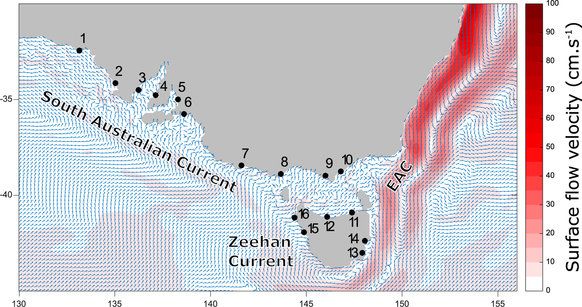
Our paper about marine connectivity just published in Nature’s Scientific Reports has important implications for the design of marine protected areas (MPAs), especially in South Australia. We jointly analysed oceanographic connectivity simulations and highly resolving genetic data and show that coastal currents – instead of promoting dispersal across vast regions as traditionally assumed – are actually promoting the retention of larvae close to parental habitats, even in high ‘dispersive’ species.
This supports the idea that closely spaced MPAs represent a more suitable management approach than the design of large but geographically distant MPAs, because the majority of larvae will not disperse over greater distances.
We plan to better assess this finding using population genomic data of multiple species from across SA’s network of marine parks.
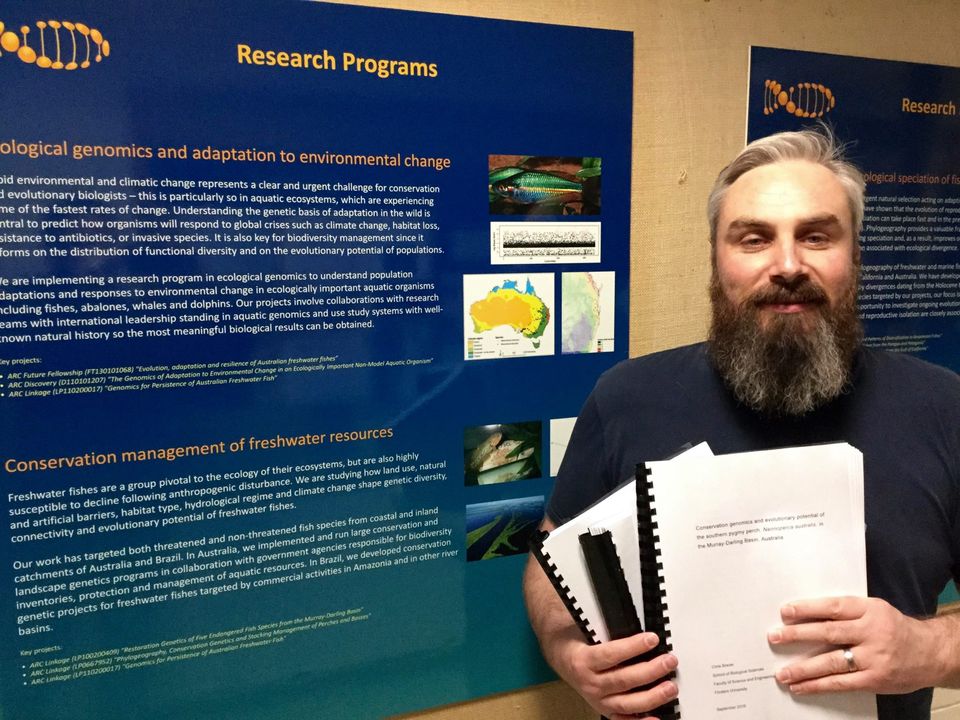
Congratulations Chris Brauer for finishing his PhD thesis!
PhD #17 of the MELFU and the lab’s first thesis on “population genomics”. This work pioneers conservation genomics studies for southern hemisphere aquatic animals.
Thesis title: “Conservation genomics and evolutionary potential of the southern pygmy perch, Nannoperca australis, in the Murray-Darling Basin, Australia”
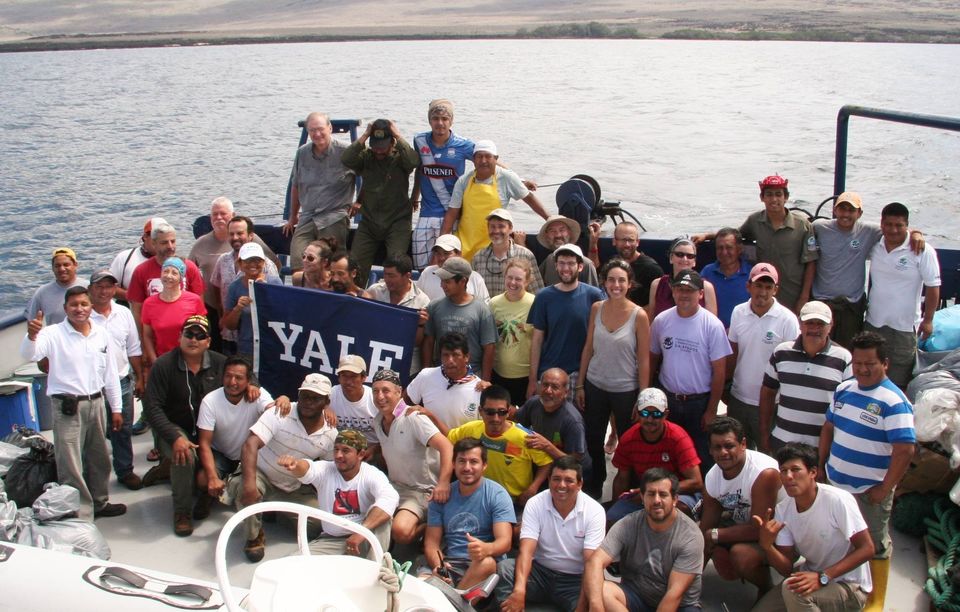
In November/December 2015 we went on an expedition to the Galápagos Islands in search of two extinct species of giant tortoises. It may sound like a fool’s errand, but our expedition was a success.
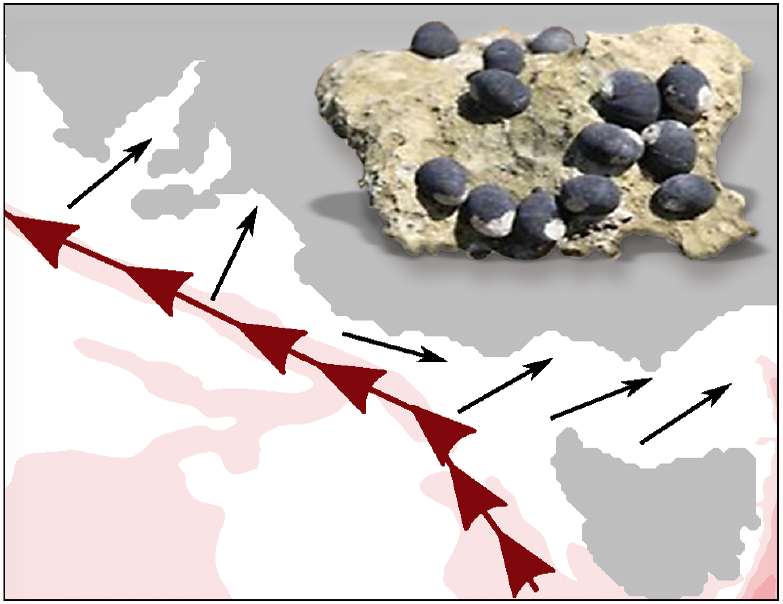
Boundary currents are often considered to be the main drivers of connectivity among populations of coastal animals. Teske and co-workers combined population genetic data from a southern Australian snail that has a very long planktonic larval duration with simulations of connectivity based on oceanographic data. They show that most propagules never reach the region’s boundary currents, and few of those that do will return to the coast to settle. Retention of larvae on the continental shelf results in a strong range-wide correlation between genetic and geographic distance, a pattern that is usually only found in species with much lower dispersal potential.
Teske PR, Sandoval-Castillo J, van Sebille E, Waters JM, Beheregaray LB (2015) On-shelf larval retention limits population connectivity in a coastal broadcast spawner. Marine Ecology Progress Series 532, 1-12.
See details in in MEPS feature article page.
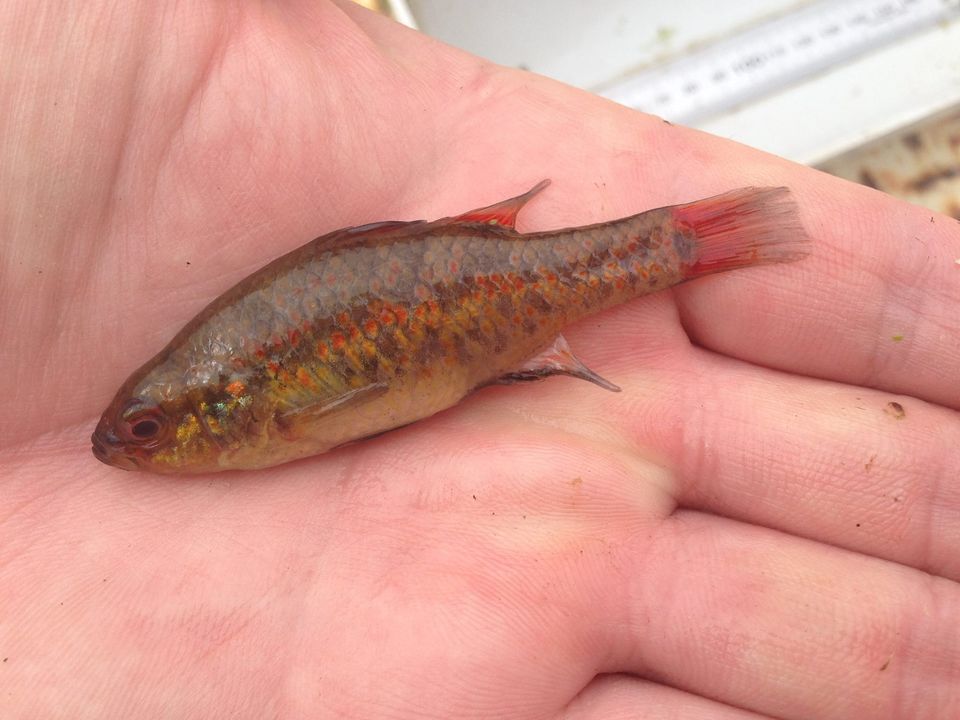
Conservation work can sometimes be a little depressing but we have some great news from one of the projects in the lab. Recent fieldwork on Hindmarsh Island resulted in the capture of 45 southern pygmy perch (including pregnant females) at one of the sites where fish from the captive breeding program were released in 2011. This represents the largest number of this species found in the area since before the drought.
This work is part of the PhD project of MELFU’s Chris Brauer and is also a subproject on an ARC Linkage on restoration and conservation genetics of fishes from the lower Murray Darling Basin. In this project we implemented captive breeding programs for four endangered freshwater fish using genetic information to reduce inbreeding in captivity. Reintroduction and monitoring of captive-born fish is underway.
Although pygmy perches have a long way to go before reintroduced populations can be considered as established in the lower MDB, the good number of recaptures is certainly a promising sign for the future. Thanks go to Nick Whiterod from Glenelg Nature Trust for assistance in the field.



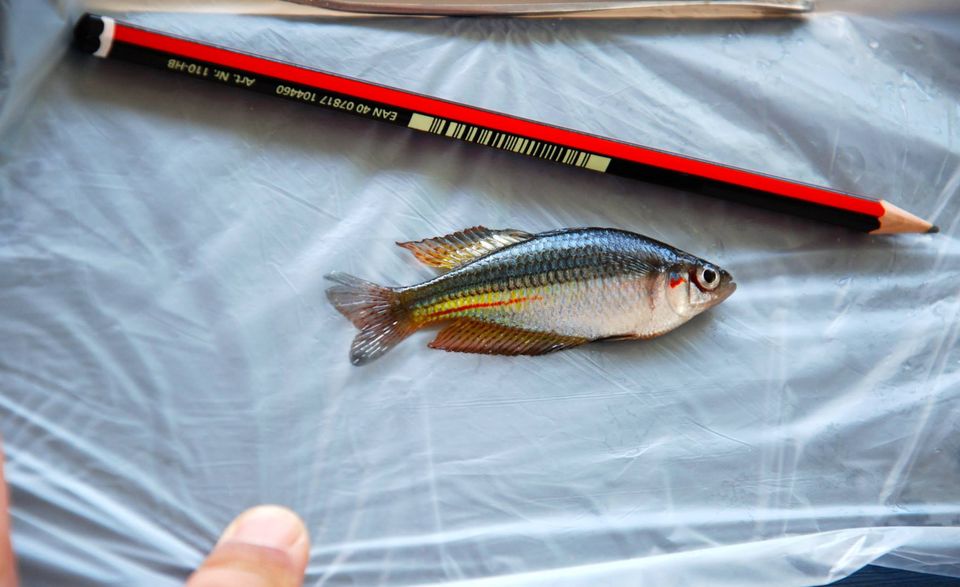
Between September and December 2014 or team travelled over 10,000 km along eastern and central Australia to sample climatic ecotypes (i.e. locally adapted populations) of rainbowfish. We successfully managed to transport live specimens from the 7 ecotypes targeted by these expeditions to our captive breeding facility in Adelaide. All populations are already breeding! We also collected samples for studies of global gene expression in wild caught specimens (i.e. “transcriptomics in the wild”).
This research program uses an evolutionarily young and ecologically important rainbowfish clade to understand adaptive resilience and to test predictions derived from the ‘climatic variability hypothesis’ for the major climatic regions of mainland Australia. Correlative surveys along landscapes and mechanistic experimental studies will be integrated to implement a comparative evolutionary genomics framework capable of assessing the genetic basis of adaptation and the evolutionary resilience of populations and lineages. We hope to clarify climatic and geographic correlates of adaptation across a vast area of Australia and to disentangle plastic from evolutionary responses to environmental change using rainbowfishes, an emerging model system for adaptation research.
Visit our Facebook lab page for more photos and information about this project.





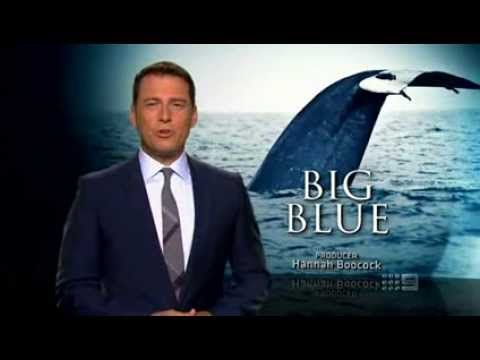
TV program “60 Minutes” recently featured a documentary about the adventures of A/Prof Luciana Moller and Dr Cat Attard while working with blue whales in the Maldives. In addition, MELFU has recently embarked on a novel conservation genomics project of blue whales funded by the Sea World Research & Rescue Foundation – high resolution data are being produced to assist the conservation management of the world’s largest animal.
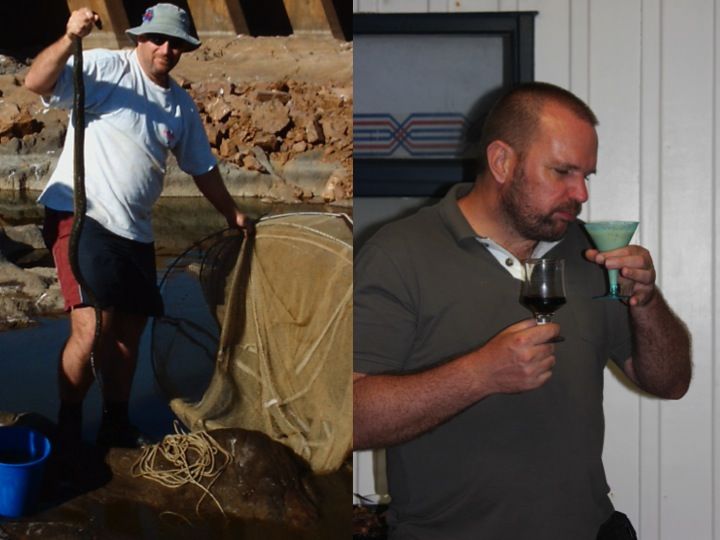
Congratulations to the MELFU’s senior (literally speaking!) research fellows!
2013 has been a great year for Steve Smith and Peter Teske. They have been offered tenure academic positions at University of Veterinary Medicine Vienna and at University of Johannesburg, respectively. Steve has recently left Adelaide and is now enjoying the mountainous landscape and cheap Austrian beer, whereas Peter will stay with us until July.
Both Steve and Peter shall remain closely linked to our lab and will probably retain their noble title of “Senior Research Fellows” for years to come.
We wish them all the best in their new careers!
(it looks like we’ll have to organize lab retreats in another two continents in the near future…)
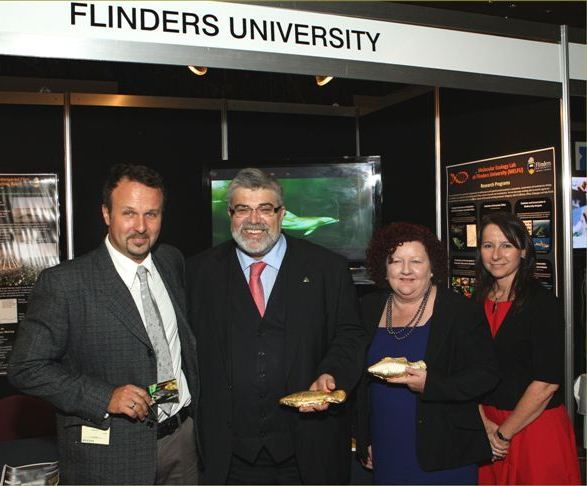
Prof. Luciano Beheregaray was the researcher selected to represent Flinders University at the Australian Research Council (ARC) Major Grants Expo. The expo was held in the Great Hall of the Parliament House, Canberra, on the 1st of November 2011. Prof Beheregaray attended the expo along with the Director of Research Services, Dr Gayle Morris.
Research findings and current projects of the Molecular Ecology Lab were on display – especially our project about reducing extinction risk of endangered fishes from the lower Murray River. As part of the Flinders presentation, a gift of a Haigh’s chocolate fish was presented to Senator Carr, former Minister for Science and Innovation and to Prof. Margaret Shiels, Chief Executive Officer of the ARC. Senator Carr, a keen fisherman, was quite interested in the research being produced at Flinders.
We also distributed a ‘Native Fish Identification’ card (developed for the Expo by the Research Services Office and the Marketing and Communications Office). The card proved to be quite popular with the groups of Canberra schoolchildren who also attended the Expo.
News source: Flinders Inspiring Research, December 2011
